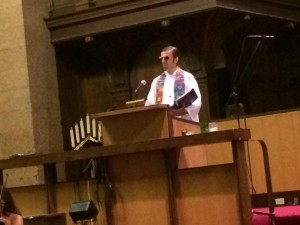 To many, Peoples Temple is best known for its end. On November 18, 1978, 909 members were killed in “Jonestown,” Guyana, drinking cyanide-laced Flavor-aid from their leader, Jim Jones. While the incident shocked the world at the time, it was a culmination of Jim Jones’ abuse throughout Peoples Temple’s existence.
To many, Peoples Temple is best known for its end. On November 18, 1978, 909 members were killed in “Jonestown,” Guyana, drinking cyanide-laced Flavor-aid from their leader, Jim Jones. While the incident shocked the world at the time, it was a culmination of Jim Jones’ abuse throughout Peoples Temple’s existence.
I, however, know Peoples Temple best as a reflection of my own self. It was a vibrant California community that demonstrated a commitment to Christian-inspired progressive politics that I share. A majority-black congregation with a white leader, they began as an interracial church with an anti-racist socialist message that would have inspired me. I identify with the African-American worship styles that Peoples Temple used. Temple members, energized by their bold vision but threatened by an oppressive world, experienced profound hope and fear simultaneously, and these emotions are often dominant within myself.
Jim Jones grew up in Indiana where he founded Peoples Temple before moving it to California. Being a white man from the midwest who moved to the bay area as an adult gives me one uncomfortable biographical similarity to Jim Jones. More importantly, both Jones and I had roles in majority-black communities of faith. My own experience as a music director for African-American congregations forced me to confront a certain power and privilege fueled by racial injustice. Understanding how easily Jim Jones abused this power, I need to take caution.
Even more, Jones and Peoples Temple demonstrated disregard for convention and defiance of outside authority. Jones attacked “capitalism” constantly, as well as prevailing political leaders. He preached increasingly against the church, especially a “skygod” that served the interests of the establishment, and threw a bible across the room. Energized by opposition, he used threats to strengthen his own power, and orchestrated events such as his apparent shooting (which he miraculously survived) and the bombing of a bus. The Temple achieved a near total unaccountability to the outside, which ultimately permitted the unthinkable.
As an experimental musician, my work rejects conventions with the same blatant disregard. I use abrasive chords and unusual timbres that challenge listeners. I ask singers and instrumentalists to generate discord by improvising variations, or even instruct them to “play anything” for all-out cacophony. My rejection of convention allows me to do deeply original work work free from accountability to musical traditions, but I also fear it may be dangerous, as it was for Peoples Temple.
Composing this piece allowed me to meditate on what went wrong with Peoples Temple, and how to avoid its mistakes. I wanted to explore not only what happened at the Temple, but what it sounded like, and how to express those sounds in my musical language.
Libretto text comes mostly from words spoken at Peoples Temple, thanks largely to FBI tapes published and transcribed by the Jonestown Institute. Some of the text is original. I also re-present Christian songs that were familiar to Temple members. At one point, the Jim Jones character sings “Down From His Glory,” with word changes that encourage the listener’s devotion to him. It is heard on the 1974 album He’s Able by the Peoples Temple Choir.
I also borrowed text from printed Temple materials now held by the California Historical Society. In particular, printed references to Matthew 25:35-45 as a biblical call for social justice, and the song “I shall not be moved,” as an expression of defiance against oppression, (yet loyalty to the Temple), have guided my composition.
I wove this material into a narrative. At a San Francisco worship service, Anne, an imaginary Temple member based on real individuals, joins the community, celebrates a miraculous healing (albeit faked as most were) and later attempts to leave. Afterwards, the Temple’s governing “planning commission,” convenes. Jones expresses fear of the outside, which threatens both the church’s ideology and his own power. The commission plans to communicate this fear.
Former members are the greatest threat, as they prepare to expose (or “invent”) Jones’ abuses. In particular, an article from Rupert Murdoch’s New West, would report disturbing incidents and call for an investigation. When Jones realized he could not stop it from publication, he left immediately for his “promised land,” the Peoples Temple Agricultural Project, dubbed “Jonestown,” and over the next month persuaded nearly one thousand members to do the same.
In my work, another worship service convenes after the article comes out, and Jones now appears only on a television screen, asking his congregants to join him in Guyana. Television propaganda was an important tool for Jones to entice members into Jonestown. With the sounds of worship and gospel music returning, they begin packing their boxes and making their way to Guyana, where they would spend about fourteen months before their tragic end.
Cast members may come from any background, and need not represent any particular race of character. Any of us can commit to racial and economic freedom, and people of all backgrounds can experience some kind of oppression. However, since I believe Jim Jones was only able to cultivate absolute power thanks to his privileged status as a white man, it must be clear his character does not experience oppression.
I appreciate everyone’s presence at this performance, and the opportunity to share my meditation with you. I am also grateful to everyone who helped make this project happen, from the outstanding performers and artistic collaborators, to friends, family and many others who offered advice and encouragement, to the many who helped back the production financially. I look forward to hearing what this experience is like for you, and you may contact me at AndrewBarnesJam@gmail.com.